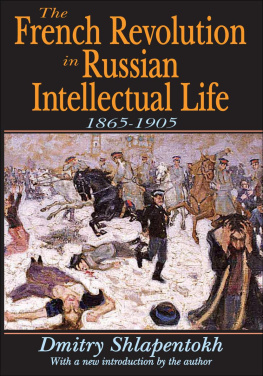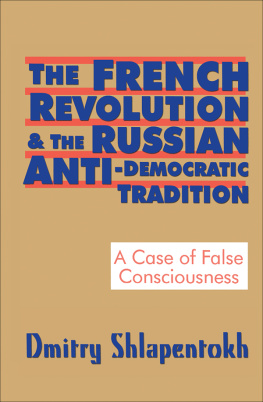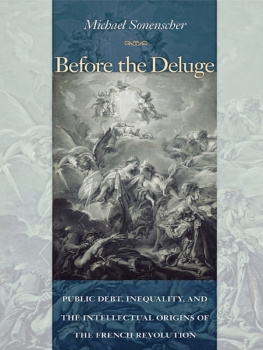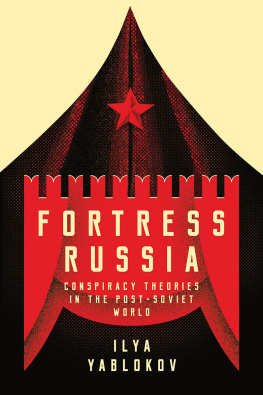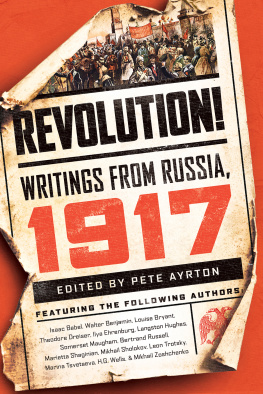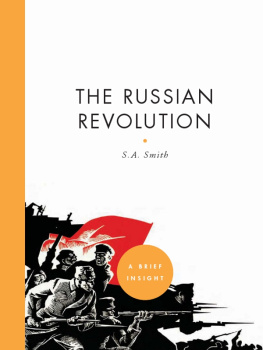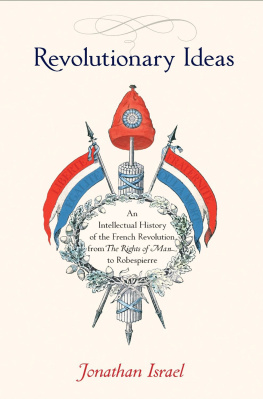Originally published in 1996 by Praeger Publishers.
Published 2009 by Transaction Publishers
Published 2017 by Routledge
2 Park Square, Milton Park, Abingdon, Oxon OX14 4RN
711 Third Avenue, New York, NY 10017, USA
Routledge is an imprint of the Taylor & Francis Group, an informa business
Copyright 2009 by Taylor & Francis.
All rights reserved. No part of this book may be reprinted or reproduced or utilised in any form or by any electronic, mechanical, or other means, now known or hereafter invented, including photocopying and recording, or in any information storage or retrieval system, without permission in writing from the publishers.
Notice:
Product or corporate names may be trademarks or registered trademarks, and are used only for identification and explanation without intent to infringe.
Library of Congress Catalog Number: 2008021751
Library of Congress Cataloging-in-Publication Data
Shlapentokh, Dmitry.
The French Revolution in Russian intellectual life : 1865-1905 /
Dmitry Shlapentokh.
p. cm.
Includes bibliographical references and index.
ISBN 978-1-4128-0780-7 (alk. paper)
1. Russia-Intellectual life--1801-1917. 2. France-History-Revolution, 1789-1799--Influence. 3. Russia-History-Philosophy. I. Title.
DK189.2.S54 2008
947.08--dc22
2008021751
ISBN 13: 978-1-4128-0780-7 (pbk)
The framework of this book was conceived in the late 1980s, and the background of that period is important here. Certainly not everyone at the time was convinced that the USSR was moving toward its demise. But there was a strong feeling that the Stalinist framework of the system had been irreversibly damaged, in fact lost for good. This irreversible transformation was compared with the collapse of socialist regimes all over Eastern Europe and with the upsurge of nationalism manifested, for example, by the collapse of the Berlin War and the unification of Germany. In all these events the rise of nationalism was reinforced, at least in the minds of Eastern Europeans and Germans, by strong democratic sentiments. The future seemed likely to spread democracy all over the world. It was a sort of springtime of the nations, a great upsurge of idealism and good will, a sense, sometimes on the collective subconscious level, that somehow all problems would be solved. On the surface, these feelings were opposed to socialism. An array of dissident writers from Eastern Europe and, of course, the USSR portrayed socialism as the regime of absurdity, mediocrity, brutality, and utopian thinking of the worst type.
Yet feelings in Eastern Europe and to some degree in the USSR actually incorporated a sort of instinctive socialism, a noncoercive collectivism, with expectations of dramatic improvement in the standard of living. Most Russians associated living-standard problems with artificial communist systems imposed by terror. Non-Russians both in and outside the USSR related their nations problems to Russian domination, a form of Russian imperialism. But both imperialism and repressive utopianism were seen as dying breeds. In a way, the totalitarian makeup of the twentieth century was seen as a sort of zigzag from the path started in the eighteenth century with the traditions of the American and French Revolutions. These visions of the past, present, and future were especially manifest in Francis Fukuyamas famous essay on the end of history.
While this feeling of a bright future dominated Europe, the USSR, and the USA, it was not the only feeling. There were those who did not see the future in such an optimistic context or prophesy the triumph of democratic ideas. In Russia, a group of communists and nationalists argued that democratization would lead not to a near-ideal society and improved living standards but to the oppositedisintegration of the USSR, a spread of crime, the impoverishment of the majority, and general economic and social collapse. It goes without saying that no one took them seriously. During the Yeltsin era they would be dubbed the red to brown, an unholy alliance of communists (to be precise, National Bolsheviks) and rabid nationalists. Even after the end of the regime and the country, their warnings were ignored or seen as idiotic; that these statements were made in Russian in marginal publications provided an additional reason to ignore them.
There were also people in the West with critical views on the post-Soviet world and a different vision of history in general. But they were hardly audible; in fact, they could hardly present their views to the general public.
One must be clear here. No one would throw you in prison for declaring that a totalitarian regime was the most viable choice for the USSR; that the achievements of the USSR were not despite but because of the repressive controlling aspect of the regime; and that in general democracy is not the bright future of humanity, including possibly the USA. You could now of course publish your statements in the emergent cyberspace. But cyberspace, except for the cyberspace of the respectable publications, is still regarded as sort of free vanity press, the abode of the grafomaniac. To be read and taken seriously, ones views must appear in respectable outlets. And no major publication in the West would print ideas that sharply contradicted the views of the vast majority. Such a manuscript would, at most, be glanced at by the editor and sent to the garbage files. Intellectual uniformity would be reinforced.
The same held true in the past. An Armenian woman got her PhD from the University of Chicago in the 1950s. In the introduction to a book published in Russia recently she described her attempt to publish her dissertation in the U.S. Her advisor agreed that it deserved to be published. But he told her no publisher would accept the work because it clearly contradicted the dominant mood in the country. Of course, trends change, but the principles, the framework of intellectual discourse does not. Consider Stalins Short History of the VKPB or Maos Red Book. There is one difference. In Maos China there was only one version of the Red Book in the modern U.S. there are two: left and right. There is usually little or nothing in between. Ideas that did not follow the recipe of the authors of red little books were ignored as sidetracks on the road to the bright future. But the sidetracks failed to disappear.
China
After Maos death, China seemed to follow the correct path of democratization as the bright future of humanity. There was a trend toward a market economy and more freedom for student demonstrations and openings to the West, and indications that the process would speed up. The fact that these events corresponded with the destruction of communist regimes in East Europe and Gorbachevs perestroika provided observers with additional arguments that in this springtime of the nations the Chinese autocratic/semi-totalitarian regime was doomed to collapse in the near future.
The 1989 Tiananmen Square massacre enhanced this feeling. Killing hundreds, possibly thousands of unarmed peaceful civilians, many of them young students, was a crime to be punished by history. There was a universal assumption that the massacre was the last shriek of the dying totalitarian beast, which, like Hitlers henchmen surrounded in the bunker, could still kill but could not avoid final doom. After the 1991 collapse of the USSRboth regime and countryit was assumed with even more certainty that the demise of the Chinese regime was at hand. But it failed to collapse.

